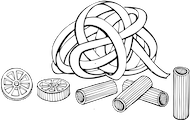In January 2023, the European Union announced a significant step towards sustainable innovation in the food sector: the authorization of the sale of insect meal . This decision paves the way for a new chapter in food production, with positive impacts on both the environment and food safety.
As you know, we at Spilucco support and promote local traditions and food products. So, if you're wondering, you probably won't find insect flours on our virtual shelves. However, given the exciting opportunities they offer and the confusion and mistrust surrounding them, we've decided to shed some light on this hotly debated topic.

First, we asked ourselves who in the world is already incorporating insect-based products into their diets, discovering that they are commonly present in the diets of various Asian, African, and Latin American countries. As for Europe , the Netherlands has long since launched projects to integrate insect meal into food production, thus contributing to environmental sustainability.
Risks and controversies of using insect flours
According to expert opinions, there is a health risk, but no different from that of other types of food products:
-
Allergies: There is a potential risk of allergies to insect proteins; the EU has required specific information labeling. Those most at risk are those who are already allergic to other animal proteins, such as crustaceans and molluscs;
-
Contamination: It is essential to ensure high safety standards in production to avoid contamination by microbes or unwanted substances;
-
Regulations and consumer perception: Regulations regarding the use of insects in human food are still evolving, and consumer perception can influence the adoption of insect-based products.
-
Food Safety: It is essential that insect cultivation and processing practices meet rigorous food safety standards to prevent microbiological or chemical risks.
What we don't want to dwell on, however, are the subjective aspects, such as the mistrust of eating foods so far outside our common standards, or the fear that these flours could jeopardize the Mediterranean diet.
What are the benefits of using insect meal?
The EU's authorization was determined by the desire to pursue two important objectives:
Reducing environmental impact
Growing insects requires less land, water, and food than traditional meat production. Furthermore, insects are known for their ability to grow rapidly and with minimal environmental impact. This transition could therefore help mitigate some of the challenges associated with large-scale food production.
Benefits for food safety
Beyond environmental concerns, the approval of insect meals offers significant benefits for food safety. Insects are rich in proteins, vitamins, essential minerals, and healthy fats, helping to diversify the food supply and address malnutrition issues.

How insect flours are used
With decisions of January 2023, the European Union authorized the sale of cricket (Acheta Domesticus) flour and mealworm (Alphitobius diaperinus).
Insect meals, contrary to popular belief, are both an alternative to animal protein sources, such as beef or pork, and to vegetable meals. These meals are versatile and can be used in various sectors of the food industry to supplement and enrich the nutritional composition of various products.
-
Alternative to animal protein: Insect meals provide a high-quality protein source, similar to traditional meats, but with a lower environmental impact. This makes them a potential sustainable alternative for those looking to reduce their meat consumption or interested in more eco-friendly protein options.
-
Addition to vegetable flours: They can also be added to vegetable flours to improve their nutritional profile. This practice allows for products richer in proteins, vitamins, and minerals, contributing to the diversification of nutrient sources.
The categories of food products in which they are used are numerous:
-
Protein bars: to increase their protein content and improve their overall nutritional composition;
-
Salty snacks: Such as chips or crackers, these may contain insect flour to provide protein and other nutrients without compromising flavor;
-
Pasta and baked goods: in combination with plant extracts in the production of pasta, bread, biscuits and other baked goods to improve their nutritional profile;
-
Meal replacements and food supplements;
-
Animal feed: used in the production of food for both domestic and livestock animals, offering an alternative and sustainable source of protein.
Conclusions:
No one is trying to impose the use of alternative food products or overturn our habits, but we believe the introduction of insect flours is an important step forward in reducing the environmental impact of intensive food industries.
Furthermore, cricket or other insect flours provide a highly nutritious nutritional choice, useful for combating malnutrition.
Clearly, there are risks of allergies and food contamination, but to the same extent as found in other products.
What's our position? We see nothing wrong with using these products, and we'll definitely try them in the future!
In the meantime, we cook our baked goods with traditionalorganic flours from our Tuscan farms, and when we feel like enjoying a nice plate of meat , we're spoiled for choice!










Leave a comment